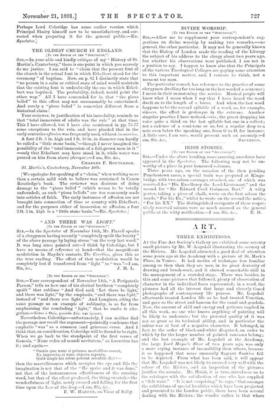[TO THE EDITOR OF THE "SPECTATOR. "] Sin,—Your correspondent of November
14th, " A Peripatetic Parson," tells us how one of his clerical brethren " completely spoilt " that sublime " And God said, Let there be light,' and there was light," by the emphasis, " and there was light," instead of "and there was light." And Longinus, citing the same passage as an example of sublimity, is so far from emphasising the concluding " light," that he omits it alto-
gether,—EiUss o OEO;, yEAciBed xeci ivevEro.
Nevertheless, Coleridge—unfortunately, I can neither find the passage nor recall the argument—pointedly condemns that emphatic "was" as a common (and grievous) error. And I think that, on consideration, Coleridge will be found to be right. When we go back to the standpoint of the first verses of Genesis, " Nunc redeo ad mundi novitatem," as Lucretius has it ; and again,-
" Omnia quw nunc si primum mortalibus esseut, Ex improviso si nunc objecta repents), Quid magis his rebus poterat mirabile dici ?- then the marvellousness which occupies the eye and fills the imagination is not that of the "He spake and it was done," not that of the instantaneous effectiveness of the creating word, but that of the effect produced, the thing created,—the wonderfulness of light, newly created and falling for the first time upon the face of the deep.—I am, Sir, Sc., F. W. HARPER, ex-Vicar of Selby.


















































 Previous page
Previous page